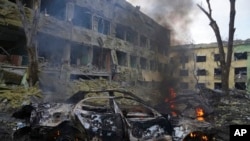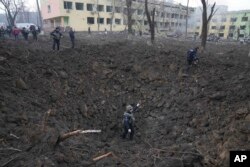Russian officials have been shifting their explanations in the past two days about why their forces struck a maternity hospital in the besieged Ukrainian seaport of Mariupol, one of more than a dozen health care facilities to have been attacked since Russia launched its invasion of its neighbor.
Midweek, Kremlin spokesperson Dmitry Peskov told a news agency that Russian forces “do not fire on civilian targets.” Later, as international criticism over the bombing mounted, Peskov appeared to adopt a more defensive line saying Moscow will seek information from the Russian military about the incident.
“We will certainly ask our military about this, since we don’t have clear information about what happened there. And the military are very likely to provide some information,” he told reporters at a news briefing in the Russian capital.
The next day, Thursday, Russian Foreign Minister Sergey Lavrov told reporters in Turkey, shortly after concluding peace talks with his Ukrainian counterpart, that Mariupol’s maternity hospital was a legitimate target because Ukrainian militiamen had seized it and “expelled” all the patients and doctors long ago.
In a coordinated effort, Russian embassies around the world have been echoing Lavrov’s contention on social media platforms, describing the hospital as a legitimate military target. “The truth is that the maternity hospital has not worked since the beginning of Russia's special operation in Ukraine,” tweeted Russia’s embassy in Israel. “The doctors were dispersed by militants of the Azov nationalist battalion,” it added.
But the photograph the embassy posted to show where the Ukrainian militiamen are based was geolocated by investigators affiliated with Bellingcat, an investigative journalism group, as being 10 kilometers away from the maternity hospital.
The bombing — in which three people including a child were killed and 17 people injured — has drawn fierce international criticism with the United Nations Secretary General describing it as “horrific.”
But Western diplomats and independent analysts, including former generals who have followed Russian war tactics in Syria, say that while they are horrified by the strike, they aren’t surprised by the targeting of the Mariupol hospital and Russian strikes on 18 other clinics so far in Ukraine, all documented by the World Health Organization.
They say Russia has a history of bombing of hospitals as a tactic of war, notably in Syria, with the aim of demoralizing opponents and weakening the will of civilians. Michael Clarke, former director-general of Royal United Services Institute, a defense think tank in London, told Sky News: “It's an attempt to create terror in the population and to break civilian morale. In Mariupol, they just want the city to give in.”
Physicians for Human Rights, a U.S.-based advocacy group, which has been documenting attacks on health care facilities stretching back to 2011 in Syria by Russian and Syrian government warplanes, say striking at hospitals has been a defining feature of the war in Syria.
“As a strategy of war, it is effective. It is also illegal,” the non-profit group says. “Syria is among the worst examples of targeting medical care as a weapon of war, with hundreds of attacks on hospitals and medical facilities since 2011, and nearly 900 medical personnel who have been killed.”
Action on Armed Violence, a British NGO monitoring and researching the causes and consequences of weapon-based violence, says attacks on hospitals” have been a consistent and devastating feature of Russia’s air campaign in Syria, and this inhumane tactic is now being seen in Ukraine.”
The pace of the targeting of health care facilities in Syria has been roughly consistent throughout, say analysts. But there have been notable upticks ahead of ground offensives, as well as before cease-fire and peace talks, they add.
In July and August of 2019, just as a ground offensive by Bashar al-Assad's Russian-backed forces was ramping up, 40 health care facilities were struck in the northwest province of rebel-held Idlib. The hospital-targeting airstrikes coincided with a wide bombing and shelling campaign of civilian infrastructure, which left more than 800 civilians dead and hundreds more wounded in what U.N. officials at the time described as a “scorched-earth tactic.”
What especially alarmed U.N. officials was that the GPS coordinates of the hospitals and clinics in Idlib had been shared by them with the Syrian government and the Russian defense ministry to try to ensure the hospitals would remain safe. U.N. Secretary-General Antonio Guterres ordered an inquiry into the attacks with the aim to establish whether the coordinates provided by the U.N. to Russia had been used to target the hospitals.
“The most dangerous place to be in Idlib is a hospital,” wrote visiting British surgeon David Nott in 2019. “That is the chilling fact I was told by doctors when I was in northern Syria teaching surgeons how to treat blast injuries and gunshot wounds,” he wrote on his return to Britain.
To avoid being struck, many health care professionals in Idlib copied what counterparts in the neighboring war-struck province of Aleppo learned to do in 2014 and 2015 — open underground, improvised facilities and relocate them frequently.






